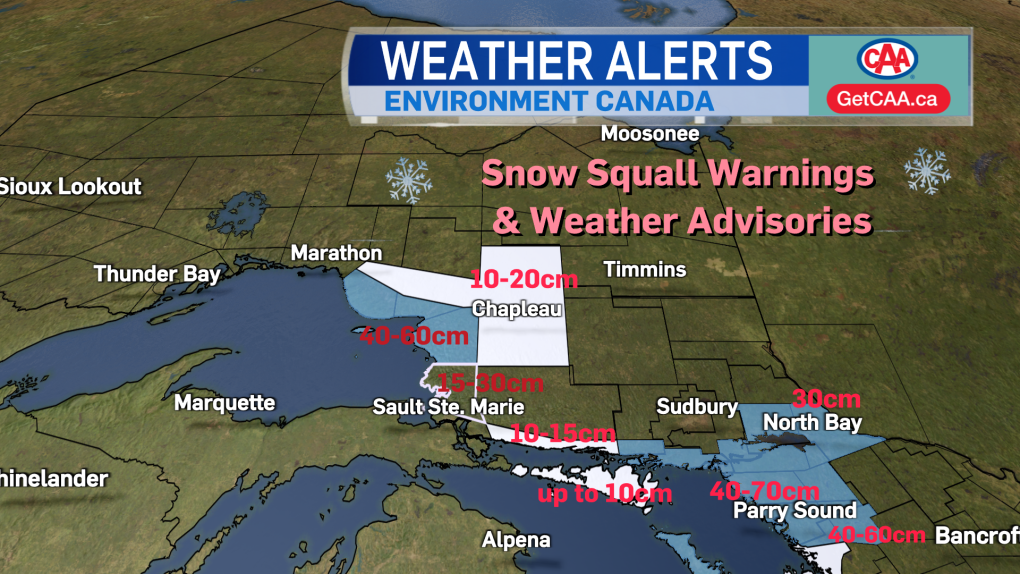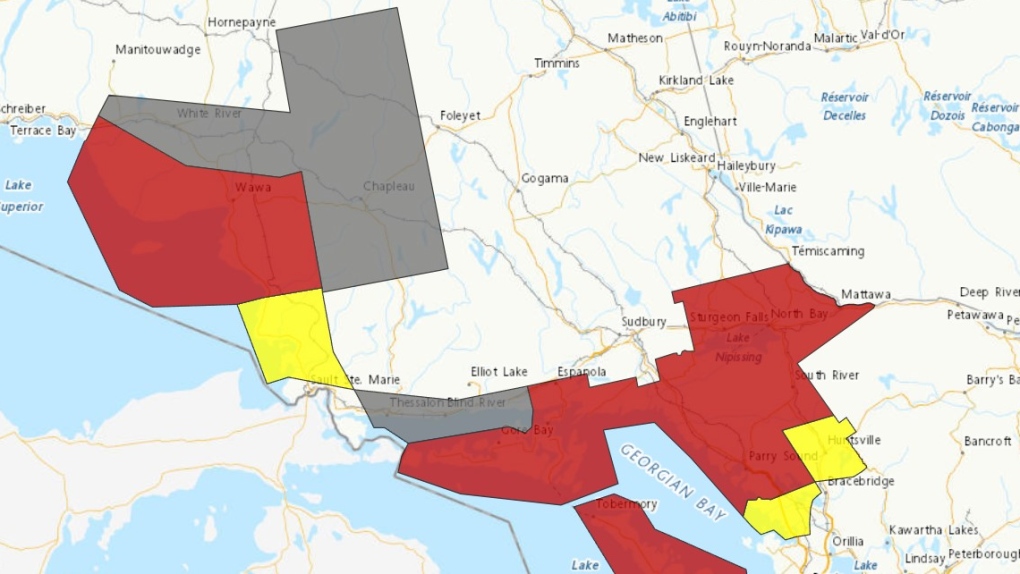Lake effect snow squalls continue across northeast moving inland
The weather alerts that began Monday are expected to continue until Wednesday in most areas as lake-effect snow moves inland from the Great Lakes in the northeast causing treacherous travelling conditions.
 Northeastern Ontario weather alert map as of 11 a.m. Jan. 16/24 (Iselle Slome/CTV Northern Ontario)
Northeastern Ontario weather alert map as of 11 a.m. Jan. 16/24 (Iselle Slome/CTV Northern Ontario)
Environment Canada is asking travellers to consider postponing non-essential travel until conditions improve.
"Visibility will be suddenly reduced to near zero at times in heavy snow and blowing snow. Rapidly accumulating snow could make travel difficult over some locations," the weather alerts said.
"Prepare for quickly changing and deteriorating travel conditions. If visibility is reduced while driving, slow down, watch for tail lights ahead and be prepared to stop."
- Download the CTV News app now
- Get local breaking news alerts
- Daily newsletter with the top local stories emailed to your inbox
 Environment Canada weather alert map for northeastern Ontario (Red - Snow squall warning, Yellow - Snow squall watch, Grey - Winter Weather Travel Advisory) Jan.16/24
Environment Canada weather alert map for northeastern Ontario (Red - Snow squall warning, Yellow - Snow squall watch, Grey - Winter Weather Travel Advisory) Jan.16/24
SNOW SQUALL WARNINGS (RED)
The Wawa and Pukaskwa Park area will get the most snow with 40 – 60 cm and even higher amounts possibly by Wednesday morning locally.
"A multi-day lake effect snow squall event will affect areas east of Lake Superior today (Tuesday) through Wednesday. Even though the snow squalls will shift with time, road closures are possible due to these significant snowfall accumulations," Environment Canada said Tuesday morning.
"Travel is expected to be hazardous due to reduced visibility … Road closures are likely."
Highway 17 is closed again between Wawa and Batchawana Bay on Tuesday due to weather after being closed for most of Monday.
The snowfall rate for Manitoulin Island on Tuesday is expected to be 10 cm per 12 hours.
"Lake effect snow will affect the eastern portion of Manitoulin Island this morning (Tuesday). The most intense snow band is expected later this afternoon and tonight. It is possible that the lake effect snow may continue into Wednesday," the snow squall warning said.
Espanola and Killarney east to North Bay, Powassan and Mattawa, including West Nipissing and French River should get between five-10 cm of snow.
"Lake effect snow bands from Georgian Bay and Lake Huron are expected to affect portions of the North Bay - Nipissing and Killarney regions. The lake effect bands are expected to shift from time to time, but should persist into Wednesday for some regions," the weather alert said.
Parry Sound and Rosseau east to South River and Burk's Falls should get 15 – 25 cm locally and another 20 – 40 cm Tuesday night and Wednesday.
Peak snowfall rates could be more than five cm/h.
"Snow squalls will likely persist for regions near Georgian Bay through at least Wednesday afternoon with additional significant accumulations expected," the snow squall warning said.
School buses run by Nipissing – Parry Sound Student Transportation Services are cancelled Tuesday in all weather zones.
SNOW SQUALL WATCHES (YELLOW)
Searchmont, Montreal Harbour and Batchawana Bay north of Sault Ste. Marie should see 15 – 30 cm of snow on Tuesday.
"Flurries will continue today (Tuesday); however, the most intense snow squalls are expected to begin tonight and continue on Wednesday," Environment Canada said.
South of Parry Sound along the Georgian Bay, Port Carling, Port Severn and Huntsville can expect to see 30 – 40 cm of possible snow with a peak snowfall rate of two to five cm/h.
WINTER WEATHER TRAVEL ADVISORIES (GREY)
Chapleau and White River should see 10 – 20 cm by Tuesday evening while Blind River and Thessalon along the North Channel could get 10 – 15 cm of snow which could continue Wednesday.
"Lake effect snow off Lake Superior will (be) extended far enough inland to affect portions of Highway 101, northern Chapleau region and near Dubreuilville. It is possible that the lake effect snow may continue into early Wednesday morning over portions of the regions," the weather alert said.
"Motorists should expect hazardous winter driving conditions and adjust travel plans accordingly. Take extra care when walking or driving in affected areas."
CTVNews.ca Top Stories

Can the Governor General do what Pierre Poilievre is asking? This expert says no
A historically difficult week for Prime Minister Justin Trudeau and his Liberal government ended with a renewed push from Conservative Leader Pierre Poilievre to topple this government – this time in the form a letter to the Governor General.
'I'm still thinking pinch me': lost puppy reunited with family after five years
After almost five years of searching and never giving up hope, the Tuffin family received the best Christmas gift they could have hoped for: being reunited with their long-lost puppy.
Two U.S. Navy pilots shot down over Red Sea in apparent 'friendly fire' incident, U.S. military says
Two U.S. Navy pilots were shot down Sunday over the Red Sea in an apparent 'friendly fire' incident, the U.S military said, marking the most serious incident to threaten troops in over a year of America targeting Yemen's Houthi rebels.
Big splash: Halifax mermaid waves goodbye after 16 years
Halifax's Raina the Mermaid is closing her business after 16 years in the Maritimes.
OPP find wanted man by chance in eastern Ontario home, seize $50K worth of drugs
A wanted eastern Ontario man was found with $50,000 worth of drugs and cash on him in a home in Bancroft, Ont. on Friday morning, according to the Ontario Provincial Police (OPP).
B.C. mayor gets calls from across Canada about 'crazy' plan to recruit doctors
A British Columbia community's "out-of-the-box" plan to ease its family doctor shortage by hiring physicians as city employees is sparking interest from across Canada, says Colwood Mayor Doug Kobayashi.
It was Grandma, in the cafe with a Scrabble tile: Game cafes are big holiday business
It’s the holidays, which means for many across the Prairies, there’s no better time to get locked in a dungeon with a dragon.
Oysters distributed in B.C., Alberta, Ontario recalled for norovirus contamination
The Canadian Food Inspection Agency has issued a recall due to possible norovirus contamination of certain oysters distributed in British Columbia, Alberta and Ontario.
opinion Tom Mulcair: Prime Minister Justin Trudeau's train wreck of a final act
In his latest column for CTVNews.ca, former NDP leader and political analyst Tom Mulcair puts a spotlight on the 'spectacular failure' of Prime Minister Justin Trudeau's final act on the political stage.































